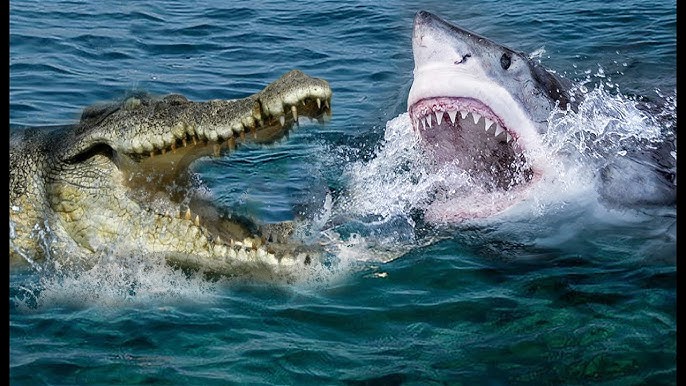
The debate over who would win in a confrontation between a crocodile and a shark is a popular topic among wildlife enthusiasts and animal lovers alike. Both animals are apex predators in their respective environments, with unique adaptations that make them formidable hunters. This article will explore the characteristics, strengths, weaknesses, and potential outcomes of a hypothetical battle between these two powerful creatures.
Overview of Crocodiles
Crocodiles are large reptiles belonging to the family Crocodylidae. They are primarily found in tropical regions of Africa, Asia, the Americas, and Australia. Known for their powerful jaws and aggressive behavior, crocodiles are excellent hunters both in water and on land.
Physical Characteristics of Crocodiles
- Size: Adult crocodiles can grow up to 23 feet (7 meters) long, with some species like the saltwater crocodile being among the largest reptiles in the world.
- Weight: Depending on the species, adult crocodiles can weigh between 1,000 to over 2,200 pounds (450 to 1,000 kg).
- Bite Force: Crocodiles possess one of the strongest bite forces of any animal, with some estimates reaching up to 3,700 pounds per square inch (PSI).
- Skin: Their tough, scaly skin provides protection against predators and environmental factors.
Overview of Sharks
Sharks are cartilaginous fish belonging to the subclass Elasmobranchii. They inhabit oceans worldwide and come in various species, each adapted to different marine environments. The great white shark is one of the most well-known species due to its size and predatory prowess.
Physical Characteristics of Sharks
- Size: Great white sharks can grow up to 20 feet (6 meters) long or more.
- Weight: Adult great whites typically weigh between 1,500 to 2,400 pounds (680 to 1,100 kg).
- Teeth: Sharks have multiple rows of sharp teeth designed for tearing flesh; they continuously shed and replace teeth throughout their lives.
- Sensory Systems: Sharks possess advanced sensory systems that allow them to detect vibrations and electrical fields in the water.
Key Differences Between Crocodiles or Sharks
The following table summarizes the primary differences between crocodiles and sharks:
| Feature | Crocodile | Shark |
|---|---|---|
| Classification | Reptile (Crocodylidae) | Fish (Elasmobranchii) |
| Habitat | Freshwater and saltwater | Saltwater (mainly) |
| Size | Up to 23 feet (7 meters) | Up to 20 feet (6 meters) |
| Weight | 1,000 – 2,200 pounds (450 – 1,000 kg) | 1,500 – 2,400 pounds (680 – 1,100 kg) |
| Bite Force | Up to 3,700 PSI | Approximately 1,200 PSI |
| Hunting Technique | Ambush predator | Active hunter |
| Social Behavior | Generally solitary | Some species exhibit social behavior |
Strengths and Weaknesses
Strengths of Crocodiles
- Powerful Bite: With one of the strongest bites in the animal kingdom, crocodiles can crush bones and hold onto prey with immense force.
- Ambush Predators: Crocodiles excel at ambushing their prey from the water’s edge or while submerged.
- Adaptability: They can thrive in both freshwater and saltwater environments.
Weaknesses of Crocodiles
- Limited Speed in Water: While crocodiles can swim quickly over short distances (up to 15 mph), they are not as agile as sharks in open water.
- Breathing Limitations: Crocodiles need to surface for air regularly; they cannot hold their breath indefinitely like sharks.
Strengths of Sharks
- Speed and Agility: Sharks are fast swimmers that can reach speeds up to 35 mph (56 km/h), making them highly agile hunters.
- Advanced Senses: Sharks have exceptional sensory systems that allow them to detect prey from great distances.
- Endurance: Sharks can swim continuously for long periods without needing to rest.
Weaknesses of Sharks
- Vulnerability on Land: Sharks cannot survive outside of water; they rely entirely on their aquatic environment for hunting and survival.
- Less Bite Force Compared to Crocs: While sharks have powerful jaws, their bite force is generally lower than that of crocodiles.
Hypothetical Confrontation Scenarios
To analyze who would win in a confrontation between a crocodile and a shark, we can consider different scenarios:
Scenario 1: In Open Water
In an open-water scenario where both animals encounter each other:
- The shark would likely have the advantage due to its speed and agility. It could use its superior swimming capabilities to outmaneuver the crocodile.
- The crocodile’s slower swimming speed may hinder its ability to effectively engage with the shark.
Scenario 2: Near Shallow Waters
In shallow waters or estuaries where both animals may coexist:
- The crocodile could leverage its ambush tactics. It might surprise the shark by attacking from below or from a concealed position near the shore.
- In this scenario, if the crocodile manages to latch onto the shark with its powerful jaws, it could potentially inflict serious damage.
Scenario 3: On Land
If a confrontation were to occur on land (which is unlikely for sharks):
- The crocodile would have a clear advantage. It is well-adapted for terrestrial movement when necessary and could use its strength against an incapacitated shark.
Conclusion
In conclusion, while both crocodiles and sharks are apex predators within their respective domains, determining who would win in a fight depends largely on the environment. In open water scenarios, sharks would likely dominate due to their speed and agility. However, in shallow waters or areas where ambush tactics can be employed effectively by crocodiles, they may have an upper hand.Ultimately, both animals are incredibly adapted for survival in their environments. Understanding their strengths and weaknesses enhances our appreciation for these magnificent creatures. Rather than focusing solely on who would win in a fight, it is essential to recognize their roles within ecosystems and promote conservation efforts aimed at protecting these iconic species from threats such as habitat loss and climate change.





